 Fundamentals of Advocacy Module
Fundamentals of Advocacy Module
Successful advocacy is often the catalyst for making positive change happen.
How is advocacy best done to help achieve a better way forward?
What approaches and methods are needed to be an effective advocate?
The Fundamentals of Advocacy Module will lay out what you need to know along with the power dynamics that are inherent within advocacy frameworks, and help you to build the skills that are needed to be an impactful advocate.
The Fundamentals of Advocacy Module includes several components and materials such as required readings, case study, supplementary readings, and Workshop training, The Workshop component is conducted by a global leader and expert trainer who has a deep level of expertise in advocacy and a vast array of practical experience. The Workshop training enables participants to acquire a sound understanding of advocacy, including the proven principles that can elevate the ability to befittingly raise awareness about issues of concern, and seek suitable solutions to resolve issues. You will learn how to identify and
connect with those who have the power and leverage to initiate and implement needed improvements.
Armed with the new knowledge and proven techniques that will be gained from this Module, you will be able to transform issues into actions and influence positive change.
Demonstrate your commitment to learn and apply the skills of effective advocacy to your role and convey this to debtors, consumers, regulators, your peers, and the industry through enrolling in the Fundamentals of Advocacy Module. Upon successful completion, you will receive a Qualification Certificate in Fundamentals of Advocacy.
Cost to Enroll in the Fundamentals of Advocacy Module:
Regular Price $899 + tax
CDA Members $699 + tax
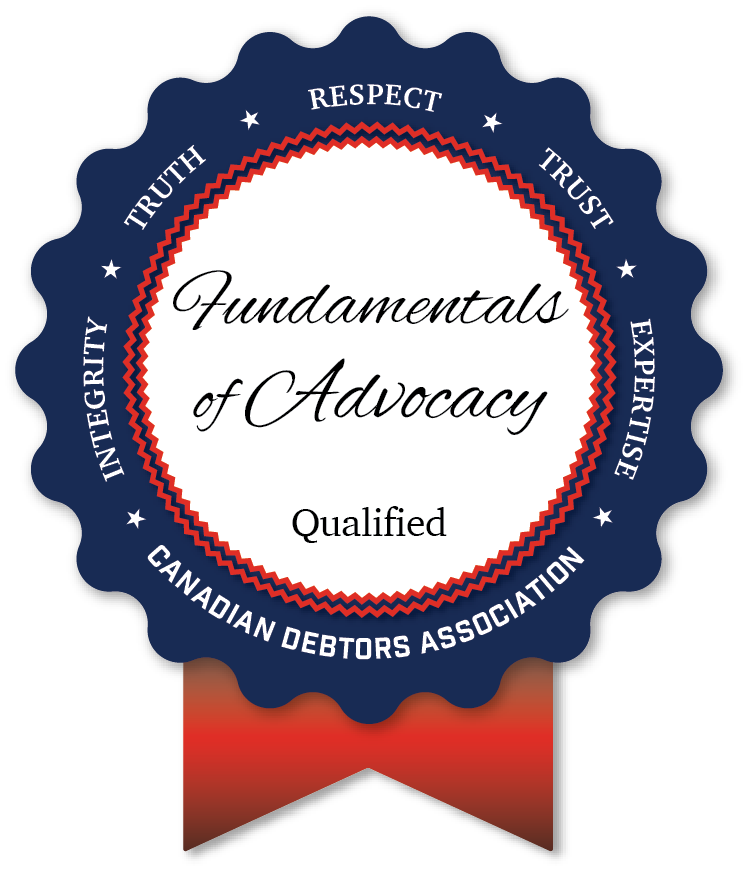
Information About the Workshop Component:
Fundamentals of Advocacy
 In this virtual Workshop, helping professionals will learn how thinking strategically about advocacy will enable them to give Canadian debtors a greater voice and influence changes in the laws, policies and programs which have a direct impact on their lives.
In this virtual Workshop, helping professionals will learn how thinking strategically about advocacy will enable them to give Canadian debtors a greater voice and influence changes in the laws, policies and programs which have a direct impact on their lives.
In the first of three 3-hour live sessions, participants will deepen their understanding of key concepts in advocacy and influencing change such as duty-bearers and rights-holders, power, privilege, and social justice.
In the second session, participants will develop critical thinking skills using a case study and applying analytical tools to define the problem situation, identify what needs to change and who has the power to make the change happen.
In the final session, participants will gain skills in developing education and persuasion strategies to influence change including creating effective arguments, lobbying decision-makers, and dealing with opposition and pushback.
Assessment will be based on a reflective learning journal to be completed by participants after each session and submitted a week after the end of the Workshop. Questions will be provided to help guide the reflection.
Course Trainer:
Olga Gladkikh is an Advocacy and Citizen Engagement specialist with more than 30 years of diversified experience as an adult educator and communications practitioner with the Coady International Institute in Nova Scotia. This includes overseas consultancies with local, national, and international NGOs in Asia (Nepal, India, Bangladesh, and Philippines), Africa (Ghana, Kenya, Tanzania, Ethiopia, Zambia, and Egypt), South Pacific (Fiji, Tonga, Vanuatu, and New Caledonia), Caribbean (St. Lucia, Antigua, Barbados), Europe (Ukraine, Moldova), as well the US and Canada.
Olga is currently a co-creator with People Development Ltd (PDLTD), a Canadian consulting firm specializing in people-centered, customized program design, process facilitation, lifelong learning and community, organizational and social change initiatives in countries around the world.
PDLTD’s network of co-creators, skilled as educators, action researchers, consultants, facilitators, designers and writers, work with others to maintain their control and ownership over processes of learning and change to strengthen their capacity to use the best of who they are to give their best to the world.
The main focus of Olga’s work is to help citizens and their organizations strengthen their capacity to participate actively in the decisions that affect their lives. Areas of specialization include designing and facilitating programs in Advocacy and Citizen Engagement, Co-operative Inquiry and Storytelling, Communication for Social Change, Strategies of Change, Development Leadership, Promoting Accountable Democracies, Gender and Power Analysis, and Social Accountability Tools and Processes for Transparency. She also conducts skill building workshops in areas such as transformative adult education, collaborative facilitation, engaging mass media and presentation skills.
Olga holds a MA in Journalism and a BA (Honours) in Psychology, both from the University of Western Ontario, and has completed course work and research towards a PhD (ABD) in Adult Education from the University of Nottingham in the UK.
Workshop Dates and Time:
Dates:
Three on-line sessions of 3 hours duration each, once a week on Tuesdays, over a period of three consecutive weeks:
Course Session 1 – Tuesday, April 13, 2021
Course Session 2 – Tuesday, April 20, 2021
Course Session 3 – Tuesday, April 27, 2021
Time:
Starting at Noon and finishing at 3:00 pm EST
Highlights of Fundamentals of Advocacy Module Learning:
Deepen understanding of key concepts in advocacy and influencing change such as duty-bearers and rights-holders, power, privilege, and social justice.
Develop critical thinking skills using a case study and applying analytical tools to define the problem situation, identify what needs to change and who has the power to make the change happen.
Gain skills in developing education and persuasion strategies to influence change including creating effective arguments, lobbying decision-makers, and dealing with opposition and pushback.
By enrolling in the Fundamentals of Advocacy Module, you are also on your path towards achieving your Certified Debtor Advocate professional designation. Attaining the Fundamentals of Advocacy Certificate is one of the five mandatory elements of expertise required to earn the Certified Debtor Advocate credential that is bestowed to qualified individuals by the Canadian Debtors Association.
Ethics & Values Module
Ethics are at the heart of competent and effective practice for those in the helping field.
This module includes a workshop, training manual, study materials, required readings, supplementary readings, and an exam.
The workshop component is a live, one day, online virtual workshop that is conducted by an expert trainer. The workshop will be interactive and include features such as shared screen and breakout rooms. Student class size is designed to allow the trainer to facilitate an engaging and rewarding workshop experience.
The reading materials component consists of required reading and suggested, optional reading that is intended to further enhance the student’s knowledge.
Demonstrate your commitment to the highest of ethical standards and strong values and convey this to debtors, consumers, regulators, your peers, and the industry through completing this module.
Cost to Enroll
Regular Price $699 + tax
CDA Members $499 + tax
Upon successful completion, you will receive a qualification Certificate in Ethics & Values. This Certificate is one of the five mandatory components of expertise required to achieve the Certified Debtor Advocate credential that is bestowed to qualified individuals by the Canadian Debtors Association.
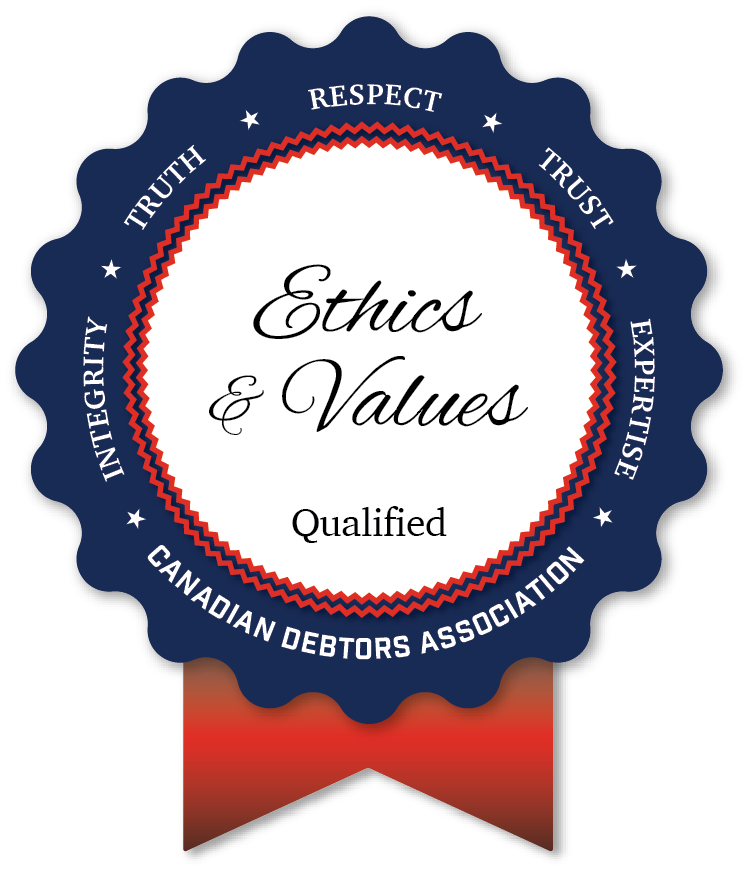
Workshop Details:
The Ethics of Helping — Boundaries and Relationships
Date: Tuesday September 21, 2021
Time: 9:00 a.m. to 4:00 p.m. Central Time
with a lunch break from noon to 1:00 p.m.
Workshop Description: Ethics are at the heart of competent and effective practice for those in the helping field. It is very common for anyone working in the helping profession to encounter ethical dilemmas. This workshop is designed to give individuals an opportunity to review common principles and standards for ethical practice that are relevant. Participants will practice using an ethical decision-making process to work through common areas of ethical concerns and leave with a stronger awareness of their own ethical base.
Workshop Topics Include:
- Boundaries and Ethics
- What’s Involved with Building Ethical Competence
- Common Principles in Helping Professions
- An Ethical Decision-Making Process
- Common Standards of Practice
- Confidentiality and Limits to Confidentiality
- Helper and Client Boundaries
- Cultural and Diversity Competence
- Ethical Technology
Workshop Learning Objectives:
At the end of this workshop, participants should be able to:
- Define the concept of ethics and how it applies within the helping profession
- Describe the common values and principles that guide codes of ethics in helping professions
- Identify steps in a process for ethical decision-making
- Describe ethical considerations for boundaries and cultural competence in the workplace
Workshop Trainer:
Vicki Enns, MMFT, RMFT is the Clinical Director of the Crisis & Trauma Resource Institute, an Approved Supervisor with the American Association for Marriage and Family Therapy and an instructor in the graduate program for Marriage and Family Therapy at the University of Winnipeg. She is the editor and co-author of the Counselling Insights book. Vicki believes in a holistic approach to wellness that applies to both clients and helpers. Vicki also believes that it is essential for helpers to continue learning and developing their self-awareness alongside evolving clinical skills. As a trainer, she is particularly gifted at creating a learning atmosphere that is collaborative and respectful, and which embraces diversity in personal identity, skills, and cultural perspectives.
By enrolling in the Ethics and Values module, you are starting on your path towards achieving your Certified Debtor Advocate professional designation.
As you progress through the certification program and earn your qualification in each module, you’ll achieve recognized competence in each subject area. You will receive a qualification certificate for each module that you successfully complete.
When you are fully qualified in all five modules of training, you’ll earn the professional designation of Certified Debtor Advocate.
Behavioural Financial Coaching Module
What makes one person thrive financially while another continuously struggles?
 You witness this every day. You see smart, well-meaning clients who never implement their financial plans; loving couples whose marriages are threatened by financial upheaval; professionals with high salaries who are mired in debt yet keep spending. It’s no easy task to help clients overcome these issues.
You witness this every day. You see smart, well-meaning clients who never implement their financial plans; loving couples whose marriages are threatened by financial upheaval; professionals with high salaries who are mired in debt yet keep spending. It’s no easy task to help clients overcome these issues.
Many people are unaware of hidden money patterns and behaviours that negatively impact their lives.
That’s why it is important to know about and adopt the use of Behavioural Money Coaching, a type of expertise that bridges two worlds – the financial services industry and the field of coaching. As a coaching tool, it enables you to help clients stop unconsciously sabotaging their own financial well-being and begin to thrive.
The Behavioural Money Coaching course component of this Module is conducted by a global leader and renowned teacher who pioneered the field of Behavioural Money Coaching. This course combines practical financial guidance with sound coaching principles. It is highly useful, specialty training for Debtor advocates, financial consultants, and coaches.
The training will give you an extra edge in your profession by teaching you the tools you need to help clients overcome their unconscious roadblocks to financial well-being. You will also learn how to connect with your clients more deeply, and communicate with them in a way that makes them feel safe and understood. Armed with new knowledge and proven techniques, you will be able to transform client financial lives from a behavioral, emotional, and practical perspective.
This course is intensive and consists of four 2-hour live, online virtual sessions conducted weekly, over a period of four consecutive weeks. Each course session will be interactive and include features such as shared screen, engaging discussion, and thought-provoking exercises to facilitate a rewarding educational experience.
In addition to the Behavioural Money Coaching training course, this Behavioural Financial Coaching Module includes study materials, required readings, supplementary readings, and an exam. The required reading and supplementary reading components are intended to further enhance the participant’s knowledge.
Demonstrate your commitment to learning world-class, behavioural financial coaching that is unique and positive in both its approach and impact, and convey this to debtors, consumers, regulators, your peers, and the industry through completing this module.
Cost to Enroll
Regular Price $500 + tax
CDA Members $350 + tax
Upon successful completion, you will receive a qualification Certificate in Behavioural Financial Coaching.
This Certificate is one of the five mandatory components of expertise required to achieve the Certified Debtor Advocate credential that is bestowed to qualified individuals by the Canadian Debtors Association.
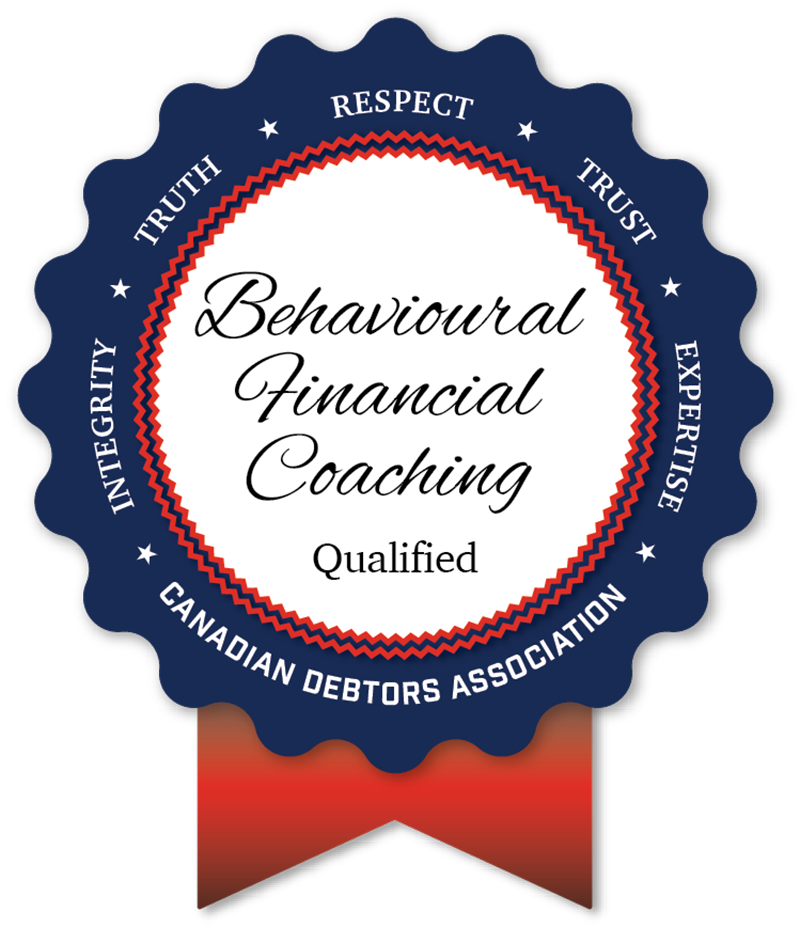
Course Details:
Behavioural Money Coaching
Dates:
On-line, once a week on Tuesdays, over a period of five consecutive weeks:
Course Session 1 – Tuesday, February 23, 2021
Course Session 2 – Tuesday, March 2, 2021
Course Session 3 – Tuesday, March 9, 2021
Course Session 4 – Tuesday, March 16, 2021
Course Session 5 – Tuesday, March 23, 2021
Time:
From 5:00 p.m. EST until 7:00 p.m. EST

Course Description:
Under financial stress and uncertainty, individuals often feel lost when it comes to money and do not know the “way” to change. They often have conflicting thoughts, feelings, and behaviours, and few people to turn to – no translator to help them understand the duality of money and how to improve their financial reality.
Traditionally, a focus on financial literacy is seen as the way to help people to cope with their financial issues. This approach, however, lacks in effectiveness because it does not generate the deep level of awareness and reflection that is needed to operationalize real change in the lives of those the professional is trying to help.
The Behavioural Coaching course will provide the Participant with a deep level of knowledge about essential guiding principles and powerful processes that can help clients to move beyond their limiting money beliefs, behaviours and unconscious patterns.
Through a step-by-step process, Participants will learn how to help clients to gently uncover the beliefs and patterns that adversely influence their lives; the stress, anxiety, fear, and financial self-sabotage. You will help people to transform their relationship with money and free them up to lead more purposeful, financially conscious, and prosperous lives facilitated by a fresh mastery over their financial circumstances.
Course Trainer:

Deborah Price is the Founder and CEO of the Money Coaching Institute, which provides money coaching services and training to professionals, individuals, couples, and families. A former financial advisor for over twenty years with firms such as Merrill Lynch, Mass Mutual, AIG and London Pacific Advisors, Deborah left the financial industry to pioneer the field of Behavioural Money Coaching in 2000.
Coping with money issues, both practically and psychologically, continues to be a major life struggle for millions of people and yet, there is very little help available. As a result, people often manifest money patterns, beliefs and behaviours that can prevent them from experiencing their full financial potential. Deborah has developed a unique, coaching program that helps clients move beyond barriers to their personal and financial success. As a result, clients experience renewed hope, restored relationships, increased confidence, and enhanced personal and financial success.
Through her international leadership and dedication to education and awareness, Deborah is committed to empowering others both personally and financially. She is the author of Money Therapy: Using the Eight Money Types to Create Wealth and Prosperity; Money Magic: Unleashing Your Potential for Wealth and Prosperity; Start Investing Online Today, and The Heart of Money: A Couples Guide to Creating True Financial Intimacy. A widely acclaimed and frequent speaker on TV and radio, Deborah has been featured in:
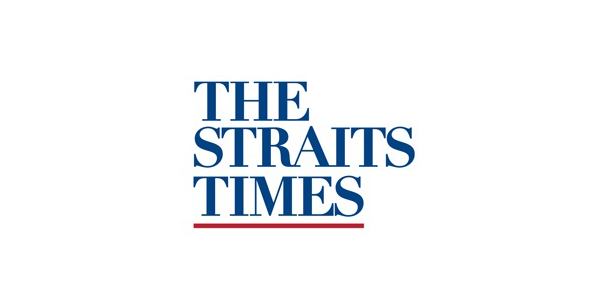


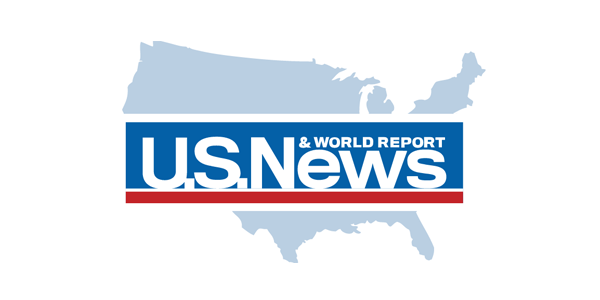



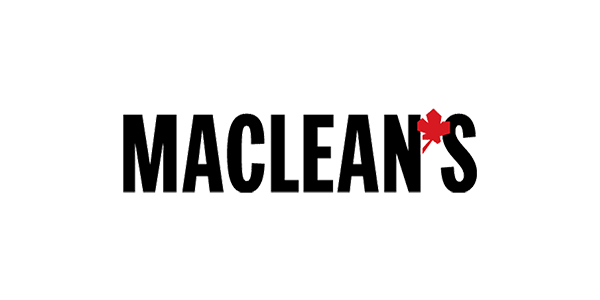
As the global leader and foremost expert in Behavioural Money Coaching, Deborah has trained over 800 Certified Money Coaches (CMC)® in 32 countries including the United States, Canada, England, Ireland, France, Italy, Denmark, Singapore, Hong Kong, Malaysia, Indonesia, Australia, New Zealand, South Africa, Kenya, Brazil and the Middle East including Saudi Arabia. She resides in Northern California with her family.
Course Topics Include:
- Mind and Money: Neuroeconomics and Behavioural Finance 101
- The Duality of Money
- Historical Exploration and Discovery Process
- Understanding Inherited Family Patterns
- Identifying and Working with the Eight Money Types
- Powerful Money Coaching
- Questions and Frameworks for Inquiry
- Identifying underlying Money Patterns and Behaviours
- Determining the Core Money issues
- Strategies for working with challenging Money Types
- Effective Coaching Techniques
- How to Develop a Client-centric Plan and Strategy for Change
Course Learning Objectives:
At the end of this course, participants should be able to:
- Provide the kind of financial coaching that supports the client to make positive changes, practically and behaviourally
- Use new tools to help clients overcome their unconscious roadblocks to financial well-being
- Help the client gain insight relative to their family of origin money patterns
- Determine client Money Types and how they are influencing their financial decisions so that they may learn and grow from them
- Help the client to become aligned with their underlying values and beliefs
- Help the client to be wiser and make more informed financial decisions
- Become a trusted ally and advocate for the client’s financial well-being
By enrolling in the Behavioural Financial Coaching module, you are on your path towards achieving your Certified Debtor Advocate professional designation.
As you progress through the certification program and earn your qualification in each module, you will achieve recognized competence in each subject area. You will receive a qualification certificate for each module that you successfully complete.
When you are fully qualified in all five modules of training, you will earn the professional designation of Certified Debtor Advocate.
Servant Leadership Module
Service Before Self is paramount and best describes servant leadership — a style of leadership that is focused on putting other people’s needs, aspirations, and interests above the leader’s own.
 Servant Leadership gives leaders the ability to connect with, build and grow meaningful, authentic relationships that facilitates truly understanding others, to use their position of influence to help others, and be of service for the greater good.
Servant Leadership gives leaders the ability to connect with, build and grow meaningful, authentic relationships that facilitates truly understanding others, to use their position of influence to help others, and be of service for the greater good.
A servant leader feels responsible for helping people learn and grow, feel purposeful, motivated, and energized. It is not about you; it is about others – your clients, stakeholders, and everyone else that you engage with. Servant leaders always strive to bring the best out of others and help them to succeed in reaching their goals.
The Servant Leadership Module includes several components and materials such as Required Readings, Case Study, Supplementary Readings, and Workshop training.
The Workshop training enables participants to acquire a foundational understanding of the servant leadership philosophy, core concepts, principles, and practices.
The Workshop is conducted by the co-founders of the Servant Leadership Academy. The Academy’s mission is to educate, train, and advance the awareness of Servant Leadership people-centred leadership philosophies and values with leaders from around the world. Through education, the Academy aspires to promote a community of global citizenship where leaders from all walks of life are focused on both the growth and well-being of the people and the communities to which they belong as well as the development of successful and sustainable organizations conscious of their social responsibility.
From this Module, you will learn how powerful servant leadership is and how adopting it for yourself can enhance your effectiveness in helping those that you serve. When people know that you care about them in a non-judgemental way, a strong bond of trust is built from having their best interests at heart.
As servant leadership skills are mastered and incorporated into your practice, you will remove the barriers that are associated with traditional styles of leadership and move forward with a greater level of skill and confidence.
Workshop Information:
Servant Leadership Principles and Best Practices Workshop
This Workshop provides participants with a foundational understanding of the Servant Leadership philosophy and values.
You will also learn about the Servant Leadership Academy Framework, which is built on the Three Circles of Influence – Purpose, Principles, and Practices. This level of awareness and understanding of servant leadership will provide a more people-centered approach to leadership and essential knowledge of the benefits of its implementation. The workshop is comprised of three 2-hour sessions.
Session Topics
Each session will cover core topics of focus that align with the Servant Leadership Academy’s Three Circles of Influence. This will give learners a strong understanding of each area of focus, and the servant leadership pillars that are connected within the specific topic area.
Session 1: Purpose
Servant Leadership philosophy teaches leaders to let go of their “command-and-control” style of leadership and share their power with the people they serve. While this seems easy in principle, the ability to relinquish control can leave a leader feeling vulnerable and uncomfortable. This is especially the case when the leader is not fully confident in who they are, what they do and (most importantly) why they do it.
This session will focus on the servant leadership pillars of Awareness and Calling to help leaders uncover their true and authentic selves, and their purpose for being a servant leader.
Session 2: Principles and Practices
Servant leaders operate with a very specific set of values and beliefs that shift the way that we see our ability to impact people, organizations, and society as a whole.
Within this session we will home in on the principles that position servant leaders to focus on the pillar of Growth and Development of those we support as being a key accountability of our role as leaders. We will explore how servant leaders promote another pillar of servant leadership through the creation of Community to allow for the inclusion and safety of people. We will also examine the fifth pillar of servant leadership; the heightened level of accountability that is practiced through the lens of Stewardship.
Session 3: Deeper Dive into Practices and Concepts
With a solid foundation of individual purpose established from the first session and a recognized set of principles and beliefs understood from session two, the third session concentrates on a strong focus and understanding of servant leadership practices. These practices are those repeatable and consistent actions and behaviours that signal a change in your leadership philosophy and reinforces those values and beliefs that act as the underpinning of your servant leadership mindset.
The pillars of servant leadership that will be closely explored include Listening, Healing, Empathy, Foresight, Conceptualization, and Persuasion. This will provide learners with a strong understanding of each concept as well as tips and tools that can implement each into daily practice for leaders moving forward. An evaluation of the participant’s learning will take place after the end of the Workshop.
This session focuses on the practices that help the people you serve avoid pitfalls along the way to their growth and development, and the role that you as a leader and mentor play in helping remove impediments that can derail the success of others.
In this session, we will also focus on the skills and talents that you as a leader have to see the road ahead, identify potential issues, and either remove impediments altogether or position those you serve to manage adversity when it happens.
The pillars that we will focus on within this final session include Foresight, Persuasion and Conceptualization – skills that you will use to help those you serve see the finish line, anticipate the challenges that they may face and, on occasion, use your ability to gently guide them away from decisions that may put themselves or others on a less desirable path.
An evaluation of the participant’s learning will take place after the end of the Workshop.

Workshop Trainers:

Kevan McBeth
At his core, Kevan is a true Servant Leader – someone who has always felt that developing amazing people is the way that you deliver extraordinary results. As co-founder of the Servant Leadership Academy, Kevin believes that true leadership comes from a place of giving more of yourself to others and to your community than what you expect in return.
Kevan builds communities and believes in the social responsibility of both individual and organization. His track record for creating safe, caring, autonomous and inclusive cultures has made him a sought-after leader in the private, public, and not-for-profit sectors.
Also, Kevan believes in social innovation. He started the We See You program, connecting youth to medical clinics in African slums, by re-directing unwanted and outdated medical supplies and donated goods, to clinics that supported Africa’s most vulnerable. He founded the I Am Stronger social movement that counteracts cyber bullying through the use of social media platforms.
Kevan has been a part of programs and initiatives that have dissolved barriers and assisted people experiencing disability find meaningful work for meaningful pay. All while helping partner organizations understand their full potential as an employer, community partner and service provider for their clients and customers.
Kevan holds certification in Servant Leadership and Gentle Teaching, as well as certificates of Administration from the University of Regina, and Corporate Social Responsibility from the University of Toronto. Kevan is also certified through ICAgile in the areas of Coaching (IC-ACC), Team Facilitation (IC-ATF), Leadership (IC-LEA) and Human Resources (IC-AHR) and is an IC Agile Authorized Instructor.

Cory Blair
Putting it simply – Cory loves to coach others. As co-founder of the Servant Leadership Academy, he lives for the opportunity to help others better understand who they are and clears the path for them to honor their authentic selves. Cory has the innate ability to see the strengths in every person he meets and the remarkable affect to make people smile.
When one cares deeply about people, a passion for creating positive organizational culture does not seem to be far behind. Cory understands that cultures are built upon a shared vision and the common values between people.
As a true Servant Leader, Cory never stops challenging himself or others, and brings an inquisitive approach to problem solving. His direct and shoot-from-the-hip approach brings an open and honest approach to his engagement with individual clients as well as organizational design and is something that is appreciated by his customers.
Cory has a degree in Political Science from the University of Regina. Cory also has certifications in ProSci™ Change Management and Servant leadership and has been a certified Kolbe™ Consultant since 2010. Cory holds certification through IC Agile in the areas of Leadership (IC-LEA) and Human Resources (IC-AHR) and is an IC Agile Authorized Instructor.
Workshop Dates and Time:
Three on-line sessions of 2 hours duration each, once a week on Tuesdays, over a period of three consecutive weeks.
Dates:
Online, once a week on Tuesdays, over a period of three consecutive weeks:
Course Session 1 – Tuesday, May 2, 2023
Course Session 2 – Tuesday, May 9, 2023
Course Session 3 – Tuesday, May 16, 2023
Time:
Starting at 10:00 am to Noon, Central Time Zone.
Demonstrate your commitment to learn and apply the skills of servant leadership to your role and convey this to debtors, consumers, regulators, your peers, and
the industry through enrolling in this Module. Upon successful completion, you will receive a Qualification Certificate in Servant Leadership.
Cost to Enroll in the Servant Leadership Module:
Regular Price $825 + tax
CDA Members $625 + tax

Highlights of Servant Leadership Module Learning:
Participants should expect to acquire the following learning outcomes:
- A foundational understanding of the servant leadership philosophy, core concepts and principles.
- The ability to differentiate between traditional leadership mindsets and approaches, and those of leaders who choose to lead through a servant leadership focus.
- An understanding of the reasoning for servant leadership, and its strong alignment with the CDA’s Principles of Conduct.
- Practical tips for shifting towards a servant leadership mindset.
- The recognition and development of new habits through servant leadership practices that encourage the growth and development of others.
- The ability to cultivate a new environment of trust and safety for others.
By enrolling in the Servant Leadership Module, you are also on your path towards achieving your Certified Debtor Advocate professional designation. Attaining the Servant Leadership Certificate is one of the five mandatory elements of expertise required to earn the Certified Debtor Advocate credential that is bestowed to qualified individuals by the Canadian Debtors Association.
Anatomy of the Debt System Module
Coming Soon

